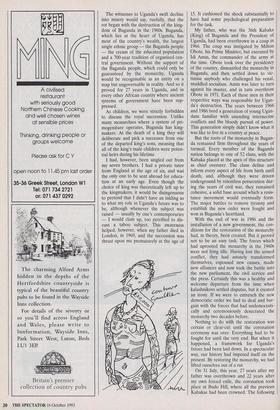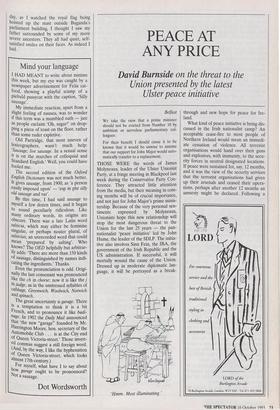MY STRUGGLE FOR A THRONE
The Kabaka of Buganda describes
how he is striving to lead his people out of tyranny
Buganda IN THE SUMMER of 1982 I made my customary journey from London to Paris. I had lived in Britain as a student and politi- cal exile for the best part of 17 years, and I Was to stay for another three. My sister, Princess Nabaloga, worked for Unesco, and her flat in Montparnasse was a pleas- ant escape from the solitude and drudgery of London life. The Francophone Africans always lifted one's spirits. They have made Paris their home, and this makes them more outgoing and better at social interac- tion than the London-based Africans, who never put down roots and do not concern themselves with life outside their immediate cultural circle.
On this particular visit, my sister had arranged a meeting with a missionary who had recently come out of Uganda and would be sure to have fresh news of home. With great expectation, 1 made my way to the Place du Fauntnoy, where I was intro- duced to a small, elderly Belgian lady sit- ting very awkwardly at one end of a settee. But far from being an. enthusiastic source of news, the missionary became agitated at every attempt to solicit infor- mation about Uganda. She did not want to discuss her work and was very circumspect about her reasons for leaving. Despite her obvious discomfiture, I pressed on, inter- rogating her. Eventually she grew angry, and at the end of an embarrassing conver- sation she pronounced, 'Uganda is dead. Nothing can help Uganda. As for the Baganda people, they are finished! Abso- lutely finished!'
I discovered later that the lady had wit- nessed the infamous Ombachi massacre, during which soldiers of the Ugandan army slaughtered several young Acholi seminari- ans and European missionaries, leaving their dead and mutilated bodies scattered across the seminary compound. The mis- sionary had somehow escaped death and made her way out of the country. No one seemed to know how she had escaped, and she certainly wasn't telling, although she was clearly traumatised by the experience.
I relate this little episode to try to convey the despair that gripped so many people as Uganda descended into misery, especially those of us who, by fortunate circumstance, had been removed from the scenes of suf- fering. The Belgian lady's verdict on Ugan- da's condition at that time was held by many people. The world was appalled, baf- fled and occasionally amused, in a rather perverse way, by Idi Arvin's excesses, and had consigned the country to a dark corner where all kinds of unspeakable things used to happen — and might happen again, for all they knew. It was left to Ugandans themselves to remove the thorns in their flesh. The witnesses to Uganda's swift decline into misery would say, ruefully, that the rot began with the destruction of the king- dom of Buganda in the 1960s. Buganda, which lies at the heart of Uganda, has most of the country's wealth, the largest single ethnic group — the Baganda people — the cream of the educated population and a 700-year tradition of organised cen- tral government. Without the support of the Baganda people, which could only be guaranteed by the monarchy, Uganda would be recognisable as an entity on a map but ungovernable in reality. And so it proved for 27 years in Uganda, and in every other African country where ancient systems of government have been sup- pressed.
As children, we were strictly forbidden to discuss the royal succession. Unlike many monarchies where a system of pri- mogeniture operates, Buganda has king- makers. At the death of a king they will deliberate and pick a successor from one of the departed king's sons, meaning that all of the king's male children were poten- tial heirs during his lifetime.
I had, however, been singled out from my seven brothers. I had a private tutor from England at the age of six, and was the only one to be sent abroad for educa- tion at an early age. Even though the . choice of king was theoretically left up to the kingmakers, it would be disingenuous to pretend that I didn't have an inkling as to what my role in Uganda's future was to be, although whenever the subject was raised — usually by one's contemporaries — I would clam up, too petrified to dis- cuss a taboo subject. This awareness helped, however, when my father died in London, in 1969, and the succession was thrust upon me prematurely at the age of 15. It cushioned the shock substantially to have had some psychological preparation for the task.
My father, who was the 36th Kabaka (King) of Buganda and the President of Uganda, had been overthrown in a coup in 1966. The coup was instigated by Milton Obote, his Prime Minister, but executed by Idi Amin, the commander of the army at the time. Obote took over the presidency of the country, dismantled the monarchy in Buganda, and then settled down to vic- timise anybody who challenged his venal, muddled socialism. Amin was later to turn against his master, and in turn overthrow Obote in 1971. Each of these men in their respective ways was responsible for Ugan- da's destruction. The years between 1966 and 1986 bred a generation of young Ugan- dans familiar with unending internecine conflicts and the bloody pursuit of power. This generation simply didn't know what it was like to live in a country at peace.
But the roots of the monarchy in Bugan- da remained firm throughout the years of turmoil. Every member of the Baganda nation belongs to one of 52 clans, with the Kabaka placed at the apex of this structure as chief overseer. The clans define and inform every aspect of life from birth until death, and, although they were driven underground by relentless persecution dur- ing the years of civil war, they remained cohesive, a solid base around which a resis- tance movement would eventually form. The major battles to remove tyranny and establish the new order were fought and won in Buganda's heartland.
With the end of war in 1986 and the installation of a new government, the con- ditions for the restoration of the monarchy had, in theory, been created. But it proved not to be an easy task. The forces which had uprooted the monarchy in the 1960s were not lying idle. Having lost the armed conflict, they had astutely transformed themselves, espoused new causes, made new alliances and now took the battle into the new parliament, the civil service and the press. Certainly this was a healthy and welcome departure from the time when kalashnikovs settled disputes, but it created an irony. If we were to entrench the new democratic order we had to deal and bar- gain with the forces that had undemocrati- cally and ceremoniously desecrated the monarchy two decades before.
Nothing to do with the restoration was certain or clear-cut until the coronation ceremony was over. Everything had to be fought for until the very end. But when it happened, a framework for Uganda's future had been laid down. In a spectacular way, our history had imposed itself on the present. By restoring the monarchy, we had lifted ourselves out of a rut.
On 31 July, this year, 27 years after my father was overthrown and 22 years after my own forced exile, the coronation took place at Budo Hill, where all the previous Kabakas had been crowned. The following
day, as I watched the royal flag being hoisted up the mast outside Buganda's parliament building, I thought I saw my father surrounded by some of my more severe ancestors. They all had quiet, self- satisfied smiles on their faces. As indeed I had.




























































 Previous page
Previous page